
 Our lives and world are shaped by the stories we choose to tell, and how we tell them. That is one reason the study of history is so vital. For it makes a huge difference what we choose to include, remember, and carry forward in the story of ourselves we share. So what story about ourselves and our world do we want to tell, and to carry forward, on this 47th anniversary of the official founding of the Uniting Church in Australia? How does this reflect the vision of church as beloved community which we heard about in our readings (from Ephesians chapter 2.17-22 and John chapter 17.1-11)? And how, vitally, do we see this story developing in the future?
0 Comments
 The writings of Paul tend to get a bad rap in progressive Christian circles. He gets the blame for the subjugation of women, the rejection of queer people and the affirmation of slavery. He is seen as a conservatising force, taking the early church away from the radical message of Jesus and turning that message into something more palatable to conservative Roman culture and thus enabling its spread. Some of that critique is certainly appropriate to the second century writings, such as the pastoral epistles of Timothy and Titus ascribed to Paul by much later writers. However, parts of Paul’s writings reveal a radical thinker, capable of reframing the reforming Judaism of his upbringing into an entirely new faith – a faith moreover informed by his own experiences of persecution and imprisonment. Today’s passage invites Paul’s readers to a number of fresh perspectives on God, creation, and the purpose of life, that continue to challenge our own thinking today. Let’s look at some of it a little more closely... 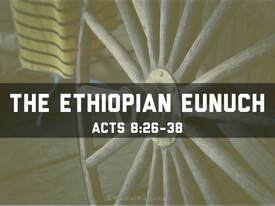 ‘Do you understand what you are reading?’ Philip’s question in Acts of the Apostles chapter 8 is such a great one, and it echoes down the centuries. Do we understand what we are reading when we read scripture? Whether we are conservative or varying degrees of liberal, it is easy to think we do. But do we really? This question is one reason that we have a sermon, or homily, or, as this community likes to call it, a reflection, in worship. For, as the eunuch responds, how can we understand unless we have a guide? The alternative is just using scripture as a looking glass, reflecting only our own faces, hopes, fears, and presuppositions. Note well, a guide to scripture is not a simple giver of answers, and certainly not determinative for all times and places. For we continue to reflect on scripture, again and again, precisely because God’s living Word, capital ‘W’, is revealed in scripture but is not fixed within its small ‘w’ words. Rather, as the great biblical interpreters have always said, God’s living Word emerges out of scripture in the encounter of human beings with the text, as guided by one another, our contexts and our deep Tradition, through the power of the Holy Spirit, the ultimate guide and inspirator. This is crucial to recall, lest we are tempted to believe that scripture is too easily understood: whether over-exalted into an idol or a supposed instruction manual, as conservatives are sometimes drawn to do; or reduced to a mere item of intellectual curiosity or piece of cultural heritage, as progressives are inclined to do. Either way, that loses the real subversive power of faith which scripture can hold for us, particularly in stories such as of the Ethiopian eunuch: which, in my view, is one of the most subversive of all in scripture, not least in its queering dimensions… Jesus is the good shepherd. Hopefully we all know that. Those of us who went to Sunday school learnt this in the first lesson often accompanied by a picture of a rather anaemic looking Jesus with flowing locks, cuddling a snowy white lamb who had clearly never done a day’s manual labour in their life! Is that right?...
 image: Kamala Bright on Unsplash image: Kamala Bright on Unsplash ‘Tell me the old, old story, when you have cause to fear.’ Yes? No? Maybe? How do you respond to that: and, more broadly, to faith, and God, in Jesus, as story? Many years ago, on the radio, one of the radical thinking clergy of the Church of England was asked about how they understood God. ‘God’, they said, ‘is the poem in which I live my life.’ Yes? No? Maybe? Does that resonate with you? Many people, secular and faith-based, would be quite dismissive. Stories, and poems not least, they would say, are typically fanciful and not factual, fabricated and too often false. Of course, that kind of response generally lacks self-awareness and is very narrow, and, often, quite ideological. Apart from not recognising that different expressions of life have their own characteristics and validity, they typically miss the way in which story, metaphor, and symbol, exist within all areas of knowledge. Science for example is full of different models, and ideas like evolution are themselves stories. Scientists are right in saying that life-giving stories are helped by empirical verification. Yet, without stories as such, it is impossible for human life and consciousness to exist. That is something that liberals and progressives, especially in faith spaces, have often missed. It is not enough to point out the weaknesses in a tired traditionalist story: whether that be about creation, sexuality, or anything else. Even more importantly, we also need to tell a new story. Populist politicians, like rabble-rousing religious preachers, know this well. Facts are malleable but stories, once established, persist: whether they are particular ways of understanding the body, the nation, the world, and, of course, God. All of us therefore have stories, conscious and unconscious, running through our heads: some of them planted there long ago, some of them picked up from the latest social media frenzy; some of them giving life-giving purpose to our lives, others providing scripts that limit us but which are hard to shake off. What then is our story?... 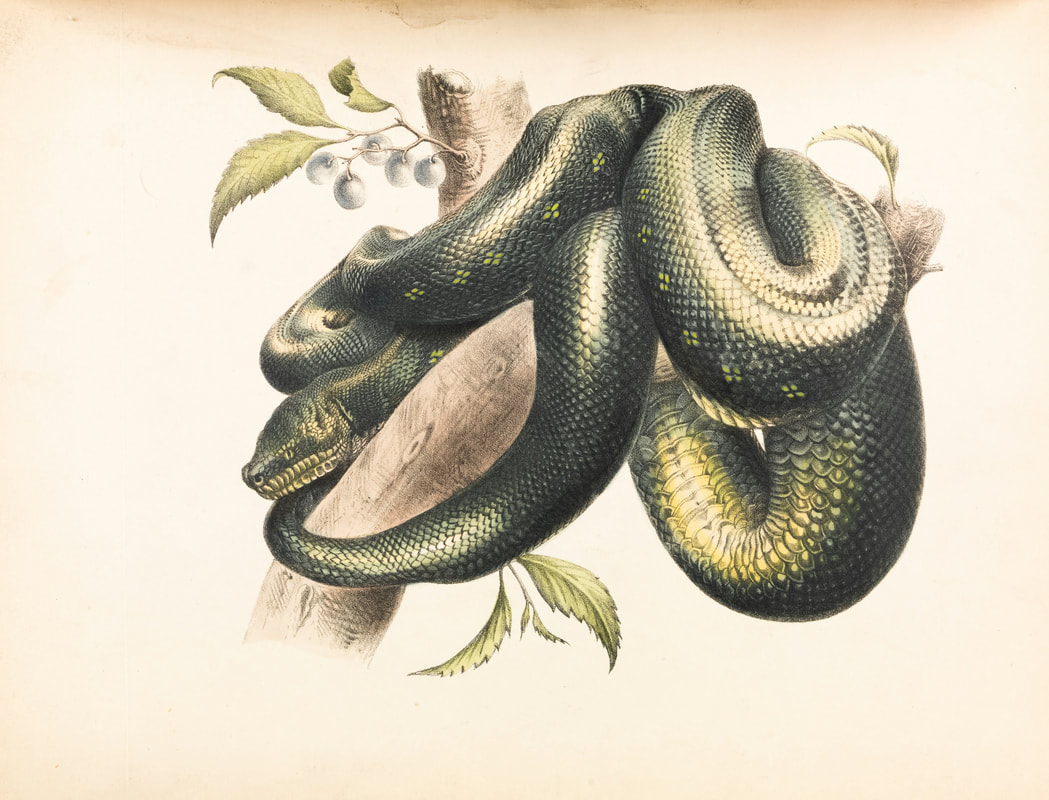 image from Museums Victoria on Unsplash image from Museums Victoria on Unsplash What do we make of the serpent of bronze on a pole which we hear about in today’s first reading? And what do we make of Jesus, pictured similarly symbolically in John’s Gospel, as a kind of snake, lifted up on a wooden pole? What do we make of the challenging stories of sin and salvation in our readings this morning?... 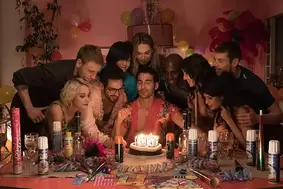 scene from Sense8 scene from Sense8 Ecstasy – what does that word mean to you? Ecstasy certainly has many associations! Some of these are deeply sacred, others far more profane. Each however has something in common: they are about standing out: standing out of the ordinary. For in its Greek origins, ecstasy means exactly that. ‘Ek’ means ‘out of’ and ‘stasis’ means ‘standing: hence ‘ek-statis’ – standing out, or away from, the norm. Ecstasy certainly therefore has important philosophical and theological aspects. Take, for example, the queer Cuban American theorist José Esteban Muñoz. I have been thinking about Muñoz because the theme of this year’s Sydney Mardi Gras is ‘Our Future’ and Muñoz gave a great deal of creative thought to imagining more loving futures. For Muñoz suggested that, in contrast to what he called ‘straight time’, at their/our best, queer people live and invite others into what he called ‘ecstatic time’. In other words, instead of living with the ‘normal’ expectations of time and this world, at their/our best, queer people seek to live and reshape this world differently. Instead of our pasts, our presents, and our futures being shaped by our birth families, and by ‘straight’ drives’ for power, children, inheritance, and wealth, at their/our best, queer people seek different kinds of happiness and societal arrangements. For, like other historically marginalised people, queer people have typically been ‘ecstatic’ people. We/they have stood outside of ordinary life and time: which is very much where our two main figures in our biblical story tonight come in – Naomi and Ruth – as striking models of the ‘ecstatic community’ into which God calls us… 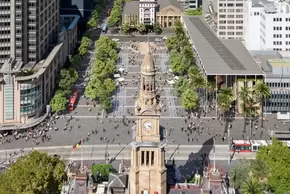 a possible future Sydney Town Hall square: artist's impression for City of Sydney a possible future Sydney Town Hall square: artist's impression for City of Sydney ‘People assume’, said the tenth Dr Who,[1] ‘that time is a strict progression of cause to effect, but *actually* from a non-linear, non-subjective viewpoint - it's more like a big ball of wibbly wobbly... time-y wimey... stuff.’ Isn’t that Time Lord right? Time is much more fascinating than we ordinarily think. In today’s Gospel reading we are in this respect challenged deeply. For we are called to choose not only to address what is valuable in past, present and future: in what we call chronological, or measurable, time, deriving from the Greek word ‘chronos’. Rather we are brought face to face with ‘kairos’, another Greek word which means the ‘right or critical’, or meaningful, time. Πεπλήρωται ὁ καιρὸς, are the key words in Greek in Mark chapter 1 verse 15: words often translated as ‘the time has been fulfilled’ (or ‘is ripe’ - for, as the verse continues, ‘the reign of God has drawn near, (repent) turn around and believe the good news’…  on wings of an eagle (image by David Clode on Unsplash) on wings of an eagle (image by David Clode on Unsplash) One ancient way of approaching spirituality, especially in the Orthodox Christian traditions, is to speak of three kinds of birdlife. The first of these, sometimes known as the ‘carnal’ life, is represented by farmyard chooks. These birds peck at the dust, clucking around, and sometimes fighting each other: confined to an enclosure, with their products used by others or being fattened up themselves for slaughter and consumption. The second, sometimes known as the ‘natural’ life, is represented by the rooster. This bird, with more intellectual capacity, is able to rise above, and see beyond, the farmyard dust; and, whilst remaining tied to it, is able to influence and manage aspects of the world of the chooks, at least to a degree. The third bird however is the eagle: who flies free, majestic, and far beyond, the limited horizons of both the chooks and the rooster. Not for nothing has the eagle thus been highly revered, across many cultural and faith traditions, not least among many First Nations peoples: being typically regarded as symbolic of great and deep strength, leadership, and vision. Now, there is of course the danger in such analogies of forms of spiritual elitism, a disregard of the ‘ordinary’, and disdain towards the material. Yet, as we hear Isaiah 40 verses 21-31 today, we are encouraged to be lifted up as ‘on eagle’s wings’. So to what kind of bird do we choose to look? What kind of life do we choose?... 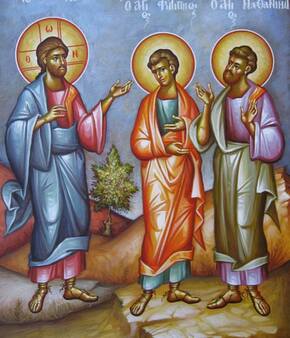 Spiritual callings are typically strange, don’t you think? As our scripture readings today attest, they often occur to the strangest of people, and/or in the strangest of circumstances. Most importantly of all, they are frequently strange in character. After all, they come from what we call divinity, which, to our ordinary ways of the world, is typically strange or slant – even, if you will, queer. Our own experiences, as well as today’s readings, bear this out, just as they invite us to listen and respond to further strange calls of our strange God in our own day. For as as recorded, in regard to the faith tradition he began, the Prophet Muhammad, peace be upon him, put it well in saying that: (Faith)… began as something strange and it will return to being strange, so blessed are the strangers.[1]... |
Authors
sermons and reflections from Penny Jones & Josephine Inkpin, a same gender married Anglican clergy couple serving with the Uniting Church in Sydney Archives
June 2024
Categories
All
|
 RSS Feed
RSS Feed